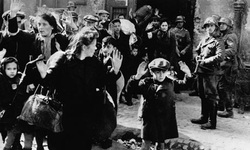 By Dalya Alberge The Observer The guilty tale of the German civil servant who married her godmother is revealed in a new book by historian Mary Fulbrook A British professor of German history has published an extraordinary exposé of the secret Nazi past of the man who married her godmother. A Small Town Near Auschwitz, written by Mary Fulbrook, who teaches at University College London, and to be published this week, tells the story of Udo Klausa, a man Fulbrook's family believed was involved only in mundane local government during the war years. However, she has unearthed unpublished material that reveals his role as a Nazi backroom administrator of the Holocaust, operating close to Auschwitz concentration camp, where more than a million Jews died. On discovering the true nature of his activities, Fulbrook said: "I felt literally like I'd been punched in the stomach. I was angry and shocked. I partly wrote the book almost to rub his face posthumously in the murderous consequence of his actions." Delving into Klausa's past was especially painful for her because her own mother – a close friend of Klausa's wife, Alexandra – was a German-Jewish refugee who lost friends and relatives to the Holocaust. It was through her mother's childhood friendship with Alexandra that Fulbrook obtained access for the first time to Klausa's unpublished memoir, written long after the war, and to dozens of wartime letters written by Alexandra. They reveal a man who "produced the preconditions" for selections and deportations. Klausa was the landrat – or civilian administrator – of a sizeable county in eastern Upper Silesia, north of Auschwitz in Poland, where thousands of people lost their liberty or their lives to his civilian policies. Yet the writings suggest that he never witnessed the results of his actions and had seemingly convinced himself of his own innocence. Fulbrook was shocked to discover how few references there were to atrocities against Jews around Bendsburg, the small town where Klausa and his family lived – even though people had been burned alive, shot, hanged or deported. One depraved act in a neighbouring county involved forcing Jews to lie for hours forming a path of human paving-stones over which Nazis walked in heavy boots. An eyewitness recorded a German standing on a Jew's face until it was "squashed to pieces". "These omissions from his memoirs are extraordinary," Fulbrook said. "He has no memory of atrocities. This is really important in understanding how the Holocaust was possible. It shows the way in which you could live with that kind of past, cover it up and present yourself as a perfectly decent, ordinary civil servant who had nothing to do with the atrocities. "If he'd conveyed anything like fear, regret, guilt, shame, I would have felt much more comfortable. But it's just a whitewashed past." Letters sent in 1942 by Alexandra to her own mother suggest that Klausa was disturbed by the unfolding events – they refer to her husband's "even worse" mood. But mass killings are mentioned coldly. Alexandra wrote: "There is constant shooting, everywhere dead Jews are lying around … One simply can't avoid seeing all this, and the constant shooting drives one quite mad." Fulbrook said the material offered a new perspective on perpetrator mentality. Other studies have focused on prominent Nazis and frontline killers or their victims, she said. But the victims only ever saw the people in the frontline of physical violence, the SS and Gestapo, the designated "perpetrators". The backroom civilian administrators were unknown to them. She came across Klausa's story while "idly" sifting through her mother's old letters. Among them was a typed memento created by Klausa's son in memory of Alexandra. It drew on his mother's own letters. One referred to 15,000 Jews being deported. Fulbrook said: "I thought, 'Where on earth was she to witness this in one day?' " Alexandra was writing from Bendsburg, Fulbrook said. "I'd never heard of it. I Googled it." It was the Germanised name for the occupied Polish town of Bedzin. There was also passing mention of Klausa as a landrat. Fulbrook said that, even though she is a German historian, she does not understand a landrat's functions. There was no literature on it – "let alone a landrat close to Auschwitz". It was after investigating further that she discovered landrats were charged with implementation of Nazi directives. Klausa went along with Nazi policies, ensuring Jews wore the yellow star, did not break the curfew, and did not use public transport or enter areas forbidden to them. After the war, West German law for prosecuting war criminals allowed the defence of "following orders" to escape a murder charge. "Thereby, Klausa fell out of the picture completely," Fulbrook said. He was never tried and later became director of a Rhineland regional council. In the book, she writes: "One part of me wants to yell back at Klausa … to scream that, without him and countless other functionaries … Hitler could never have wrought such mass destruction." Comments are closed.
|
CISA Blog
This blog provides selective critical analysis on developments in contemporary culture related to the subjects of antisemitism, racism, the Holocaust, genocide, and human rights.
|
© 2025 Canadian Institute for the Study of Antisemitism. All Rights Reserved.
 RSS Feed
RSS Feed